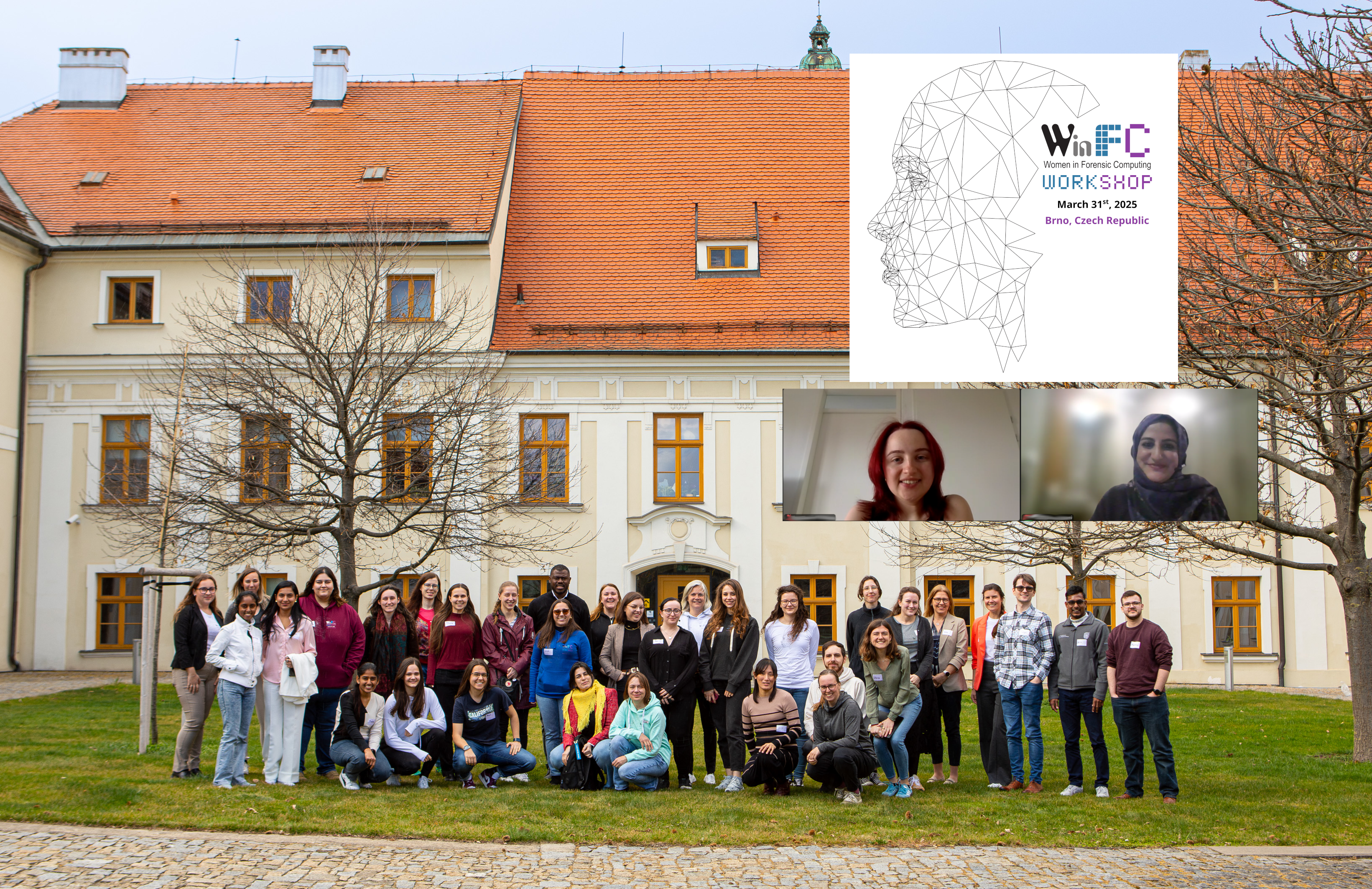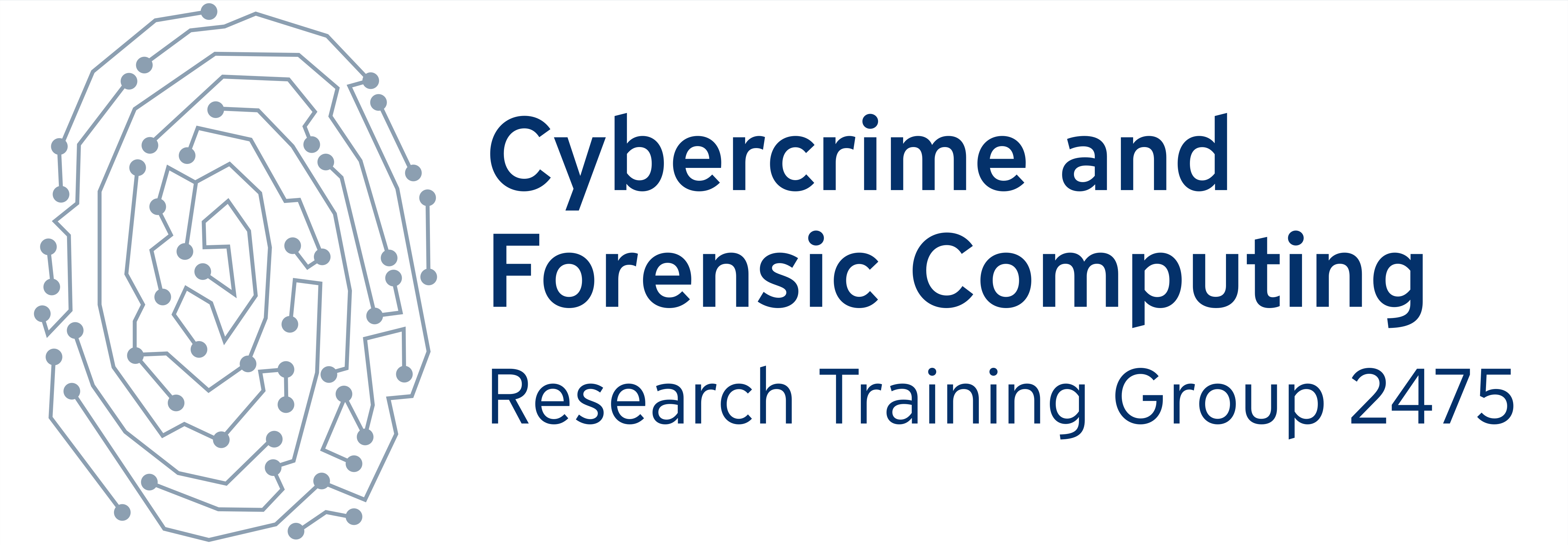Women in Forensic Computing 2025
Women in Forensic Computing Workshop and Bootcamp
held in cooperation with DFRWS EU 2025 in Brno, Czech Republic, on March 31, 2025
Scope
Digital forensic science is the application of scientific methods of computing in order to recover and investigate evidence found in digital devices, often in relation to computer crime. Digital evidence is increasingly important in almost all types of juridical proceedings, mainly due to the increasing volume and quality of digital evidence.
The objective of this workshop is to increase the interest of students and academically young researchers in digital forensic science as a career field or a research field. Another aim of this workshop is to increase awareness and appreciation of the achievements of women in the area of forensic computing/digital forensics and therefore this workshop wishes to be a forum to help women build their technical confidence and thereby attract more female researchers to the field. This workshop is aimed at introducing new people to the area. Talks will be technical but are aimed at novices in the area. The workshop is part of a workshop series that started in 2019.
The workshop will include a sequence of presentations and panels by women that introduce some fundamental and current topics of the field and allow for first-hand hands-on experience. Attendees may also present their own work in short presentations.
Post Workshop Notes and Images

In-person and online participants of WinFC 2025! Thanks for attending the workshop.
Location
D0207 Lecture Room 90, Faculty of Information Technology, Brno University of Technology
Božetěchova 2
612 00 Brno
Czech Republic
Participation
Participation in the workshop is free of charge and open to all genders, but the number of participants we can accept is limited.
To participate, complete the application form at:
https://user-surveys.cs.fau.de/index.php?r=survey/index&sid=138873&lang=en
by March 1, 2025, providing details about your current affiliation, research interests, why the workshop interests you, and whether you wish to participate in person or online. Applications after that date are also possible but will be handled on a first-come, first-served basis. Feel free to apply to participate in the workshop even after the deadline!
Please also consider submitting a presentation proposal. You can apply for a travel scholarship as well, but please note the earlier deadline of January 18, 2025.
Participant Presentations
Participants of the workshop have the opportunity to apply for a slot to present their current research or insights into a profession in the field of digital forensics in a 5-10-minute talk at the workshop. If you are interested, please send the title and an abstract of the presentation proposal together with the registration (see above) by March 1, 2025. Presentations can be delivered on-site or online. Presentations should include one slide to motivate why digital forensics is an interesting field. There will be a lightweight selection process for presentations by the organizing committee.
Travel Scholarship
We also offer several scholarships (sponsored by FAU) for female students who wish to participate in the workshop: The scholarship will cover part of your travel costs and the attendance fee for the DFRWS EU 2025 conference. For applicants from Europe, we support travel costs up to 500 EUR. For applicants from outside Europe, please give an estimate for the expected travel costs in your registration (see above) by January 18, 2025.
We will notify scholarship applicants of the organizing committee’s decision regarding whether they have been awarded the scholarship by January 25, 2025. If you need more than two months to organize your travel, please indicate this in your application by selecting the corresponding option in the application form.
Confirmed Speakers
- Dr. Nina Sunde (Police superintendent, Norwegian Police University College, Norway)
- Nina Sunde is a Police Superintendent with a PhD in criminology and works as a researcher and lecturer at The Norwegian Police University College. She co-leads the Police and Technology research group and is actively involved in research projects, including the EU Horizon-funded Clarus project and EB-CRIME. Her research primarily focuses on investigation practices related to digital evidence and cybercrime, with an emphasis on quality assurance and error mitigation in digital forensic investigations. With 25 years of experience in the Norwegian Police, where she specialized in cybercrime investigations, Sunde brings extensive practical expertise to her academic work.
- Dr. Ana Nieto (S2 Grupo, Spain)
- Dr. Ana Nieto is a cybersecurity analyst with over 16 years of experience. She was a member of the NICS Lab at the University of Málaga until 2020. Currently, she leads the malware analysis team at S2Grupo, a prominent Spanish company specializing in cybersecurity. Her team’s primary mission is to track malware employed by APT groups that pose critical threats to the security of essential societal sectors, while also collaborating closely with incident response teams. Since 2008, Dr. Nieto has been actively engaged in national and European cybersecurity projects. She holds patents and has published extensively in leading research journals in the field, with notable contributions to IoT-Forensics.
- Anika Stulíková (Police Presidium of the Czech Republic)
- Colonel Anika Stulíková currently manages the artificial intelligence and digitalization agenda at the Police Presidium of the Czech Republic as a head of the Department of Digitalization and artificial intelligence. She is also a member of the AI Strategic Group at EUROPOL and, within the pan-European Starlight project, participates in the development of AI tools for criminal justice authorities. In the past, she devoted herself to artificial intelligence with a focus on communication, ethics, and digital humanities in general. She is a supporter of Effective Altruism (especially with regard to AI Safety) and also volunteers in this area.
- Dr. Aya Fukami (Netherlands Forensic Institute, The Netherlands)
- Aya is a digital forensic scientist at the Netherland Forensic Institute. She focuses on breaking mobile device security at the hardware level.
Preliminary Program
Please note: All times listed in this program are in Central European Time (CET), UTC+1.
Monday, March 31, 2025
09:30: Arrival and coffee
10:00: Welcome by the organizers, Round of individual introductions by the attendees
10:30: Invited talk 1: Dr. Nina Sunde (Norwegian Police University College, Norway): From Individuals to Systems: Unpacking Bias in Digital Forensic Practices. Session Chair: Celine Vanini
11:00: Coffee break
11:30: Invited talk 2: Dr. Ana Nieto (S2 Grupo, Spain): Fighting Back: Combatting Anti-Forensic Strategies in Modern Malware. Session chair: Silvia Sanna
12:00: Participant Presentations (10 minutes per presentation, including questions)/Lightning talks. Session Chair: Katerina Kanta
- Florence Love Nkosi: Experiential Learning in Digital Forensics: Evaluating the Effectiveness of Simulations for Evidence Collection (online presentation) [slides]
- Jessica Herrmann: Perceptual Colour-based Geolocation of Human Trafficking Images for Digital Forensic Investigation [slides]
- Kanwal Aftab: Computer vision for indoor Multimedia Geolocation [slides]
- Olivia Sina Gräupner: Audio forensics to obtain location information
- Áine MacDermott: Deepfake Forensics: Exploring the Impact and Implications of Fabricated Media in Digital Forensic Investigations [slides]
13:00: Lunch break
14:30: Invited talk 3: Dr. Aya Fukami (Netherlands Forensic Institute, The Netherlands): Full-Stack Forensics: How the Focus of Digital Forensics Changed From Simple Data Recovery to Exploiting Security. [slides] Session Chair: Mariya Kirmani
15:00: Invited talk 4: Anika Stulíková (Police Presidium of the Czech Republic): The Dark Ages of Deepfakes and Verification of the Authenticity of Evidence. Session Chair: Lisa Rzepka.
15:30: Coffee break
16:00: Hands-on session: Svenja Mischur (sequrium GmbH): Digital Breadcrumbs: Investigating a Suspicious File
- A mysterious file, win_update.exe, appears in a user’s Downloads folder without explanation. Was it executed? What changes did it make? This beginner-friendly workshop lets you uncover the story using event logs, registry keys, and file system metadata. No experience is required — just curiosity to follow the breadcrumbs!
18:00: Workshop ends
20:00: Social event: Pivovarský dům Poupě (Dominikánská 342, 602 00 Brno-střed, Tschechien)
Organizing Committee
The workshop is jointly organized by the following people:
- Felix Freiling, FAU, Germany
- Katerina Kanta, University of Portsmouth, UK
- Yasin Köse, FAU, Germany
- Daryl Pfeif, Founding Member – Cyber Sleuth Science Lab, DFRWS, Digital Forensics Solutions
- Svenja Mischur, Germany
- Theresa Müller, Germany
- Monika Radhakisan Chavan
- Lisa Rzepka, University of the Bundeswehr Munich, Germany
- Silvia Lucia Sanna, University of Cagliari, Italy
- Mariya Shafat, University of Kashmir, India
- Radina Stoykova, University of Groningen, The Netherlands
- Céline Vanini, University of Lausanne, Switzerland
- Lena Voigt, FAU, Germany
Artwork and T-Shirt
Feel free to use the generic workshop logo in any way that spreads the word about this workshop.
You may also visit the workshop webshop to order the official workshop t-shirt and other merchandise.
Contact
Contact the organizers via email at <women-in-forensic-computing@lists.cs.fau.de>
Thanks
This workshop series is supported by the office of Gender and Diversity of Friedrich-Alexander-Universität (FAU) and by Deutsche Forschungsgemeinschaft (DFG, German Research Foundation) as part of the Research and Training Group 2475 „Cybercrime and Forensic Computing“ (grant number 393541319/GRK2475/2-2024).
